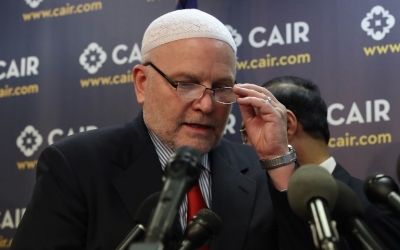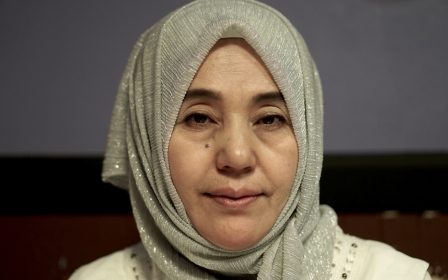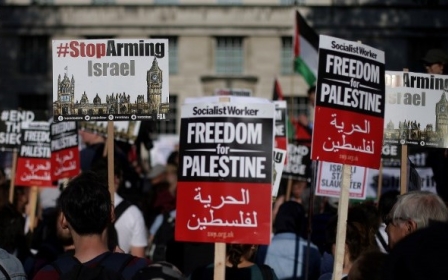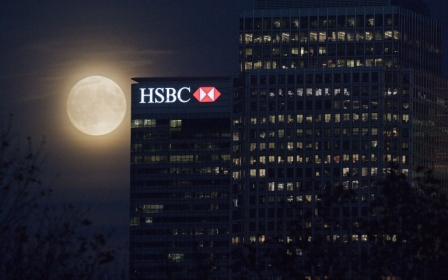EXCLUSIVE: Campaigners against Uighur oppression blacklisted on terrorism database
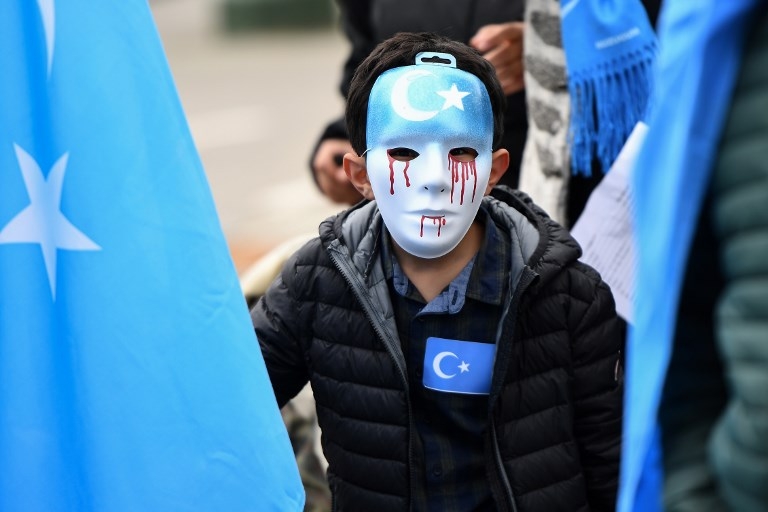
An internationally recognised advocacy group raising awareness about the repression of the Uighur minority in western China has been added to a terrorism blacklist used by many of the world’s biggest banks, Middle East Eye can reveal.
The Germany-based World Uighur Congress (WUC), which has advised the United Nations and the European Union, plans to sue the owner of the World-Check financial database after it used Chinese allegations to link the WUC to terrorism.
Dolkun Isa, the president of the WUC, and two other senior members of the organisation who were also added to the blacklist as individuals are also planning legal action.
Their inclusion on the database comes despite China facing widespread condemnation and international scrutiny over its treatment of the Uighurs, a Turkic people who are mostly Muslim, in the western province of Xinjiang.
In August 2018, a United Nations human rights panel said it had received credible reports that more than one million people were being held in internment camps. Uighur activists say that many people have disappeared in the camps and some have been killed.
New MEE newsletter: Jerusalem Dispatch
Sign up to get the latest insights and analysis on Israel-Palestine, alongside Turkey Unpacked and other MEE newsletters
Who are the Uighurs and why is China targeting them?
+ Show - HideAccording to multiple reports, more than one million Uighurs, a Muslim-majority Turkic people, are currently being held in internment camps across Xinjiang in western China (or occupied East Turkestan as many Uighurs refer to the region).
Human Rights Watch said in September 2018 that up to 13 million Muslims in Xinjiang have been subjected to “forced political indoctrination, collective punishment, restrictions on movement and communications, heightened religious restrictions, and mass surveillance in violation of international human rights law”.
The Uighurs have have been particularly targeted since Communist party leader Chen Quanguo became Xinjiang’s party secretary in 2016. Under his leadership, a massive surveillance infrastructure was unrolled across the region designed to monitor and control the Muslim community.
Uighurs and ethnic Kazakhs have been routinely rounded up for practising their Islamic faith, including praying, observing Halal, or wearing clothes synonymous with being Muslim.
The Chinese government has even labelled Islam an “ideological illness” and has destroyed some mosques in the region. In the camps, detainees are forced to learn Chinese Mandarin, praise the ruling Chinese Communist Party and face recurrent psychological and physical abuse.
Uighur activists say that entire families have disappeared into the camps, or have been executed.
China has repeatedly denied allegations that it is persecuting the minority group, instead describing the camps as “vocational training centres” designed to counter religious extremism.
It also calls concerns raised by Uighur community members, human rights groups and others “unjustified” and an “interference in China’s internal affairs”.
China describes the camps as “vocational training centres” and says they are necessary, along with other measures, to tackle religious extremism among the Uighurs and other Muslim-majority minorities.
World-Check is a subscription-only database used by banks and government bodies to screen prospective clients for links to terror or financial crime.
The database was owned by Thomson Reuters until October last year when it was sold by Thomson Reuters with other parts of its financial risk business to the investment giant Blackstone, which set up a new risk company, Refinitiv.
The owners of World-Check have been successfully sued and forced to issue apologies and pay damages to a number of organisations and individuals that were listed under the “terrorism” category on the database.
Most recently, Refinitiv in January paid damages to the head of the Palestinian Return Centre, a British charity, for falsely linking him to terrorism.
Refinitiv has previously told MEE that terrorism listings are based on "government designations and authoritative sources".
Money transfers blocked
The WUC has cited problems transferring donations internationally since it appeared on the database in 2008.
In one case, a group of Uighur refugees who escaped from a Thai prison into Malaysia in November 2017 was left stranded when the emergency transfer of legal fees raised by the WUC was blocked by Western Union and another transfer service without explanation.
The news has raised concerns among human rights groups that banks and regulators are not alive to China’s attempts to use international systems and accusations of terrorism to silence its political opponents.
The WUC, which was set up in Munich in Germany in 2004 when groups of Uighurs who had fled Xinjiang came together, did not discover it was listed on World-Check until it was contacted this year by a British law firm working on similar cases.
Dolkun Isa, the WUC president, said that since 2016 he had been unable to send or receive WUC money internationally. He said the German bank Deutsche Bank and the money transfer service Western Union, among others, had blocked payments without explanation.
A spokesperson for Commonwealth Bank of Australia, which was involved in a rejected donation to Isa's Deutsche Bank account, told MEE they were unable to discuss an individual case without consent from the customer.
Deutsche Bank declined the opportunity to comment.
On a trip to Geneva to attend a meeting of the United Nations Human Rights Council last year, Isa said he was prevented by a bureau de change attendant from changing euros into Swiss francs.
He said: “I gave ID. Then she checked and she said, ‘No. You cannot change it.’ I was surprised. One of my colleagues had to go back to change the money.”
Mehmet Tuhut, a former president of the WUC’s predecessor, the World Uighur Youth Congress (WUYC), cited similar problems.
A lawyer based in Canada since 2000, Tuhut said $5,000 sent to his Royal Bank of Canada account in October 2017 disappeared. He has been unable to retrieve it.
He said: “Just imagine, millions of people in the US and Canada are sending money every day. And $5,000 just disappeared. So we have huge difficulties like this.”
MEE contacted Royal Bank of Canada for comment but had not had a response at the time of publication.
As the WUC member in charge of immigration, Tuhut described trying to help the group of Uighur refugees who escaped from the Thai prison in 2017.
He said the WUC was prevented from sending money through both Western Union and another transfer service. He said: “These kinds of things are quite frequent.”
He said now if he wants to send or receive money, he uses his son’s name.
Omer Kanat, a co-founder of the WUC with Isa, also said Western Union had blocked payments to him.
“It is very disappointing to feel China’s influence in this way,” he told MEE.
While their banks refused to give Isa, Kanat and Tuhut reasons for blocking payments, their difficulties echo similar problems experienced by other groups and individuals listed on World-Check.
A spokesperson for Western Union told MEE that the company could not comment on customer transactions due to privacy obligations. A transaction could be declined from a variety of reasons, she added.
“Western Union reviews all transactions separately and a previous decision to approve or decline a transaction does not necessarily result in a decision to approve or decline the use of Western Union products or services in the future,” the spokesperson said.
Interpol notice dropped
China has considered the WUC a terrorist group since its inception, having proscribed its predecessor, the WUYC, with several other Uighur groups in 2003.
China says the WUC is a political wing of the Eastern Turkestan Islamic Movement, a militant group designated as a terrorist organisation by the UN Security Council in 2002. Germany and the US say there is no evidence of links between the two groups.
The WUC regularly lobbies and advises on Uighur issues at the UN Human Rights Council and at the European Parliament.
It is also a member of the Unrepresented Nations and Peoples Organization, which rejects all terrorism and violence as an instrument of policy, according to its covenant.
Dolkun Isa last year had an Interpol wanted alert that had been added to his name at the request of China lifted. He was granted German citizenship in 2006, as a refugee. He has since been given a 10-year multiple-entry visa to the US. He said he is still banned from Turkey.
Last year, China also tried unsuccessfully to prevent Isa from speaking at the UN’s advisory forum on indigenous issues.
Sophie Richardson, China director at Human Rights Watch, said: “The Chinese government has for years made these allegations of terrorism against the WUC and Dolkun Isa. But it has yet to provide evidence that actors from the US government, the UN and Interpol have found credible.”
She added: “If China has evidence, let’s see it.”
Rachel Harris, an expert on the Uighurs from the China Institute at the London-based School of Oriental and African Studies (SOAS), said the WUC is a “completely legitimate organisation which campaigns for the Uighurs in Xinjiang”.
She said the WUC’s terrorist designation was “particularly bizarre”.
“They have always been very clearly a democratic organisation,” she said.
Harris said academics had agreed in 2003 that the designation of Uighur groups by China was politically motivated.
She said China did so in an effort to “rebrand” the issue of Uighur separatism in Xinjiang in the light of the US declaration of the global “war on terror”.
Darren Byler, an expert on Uighur issues based at the University of Washington, agreed that the WUC was “not advocating for violent resistance or anything related to terrorism.”
Byler said the WUC was focused on “getting at the basic elements of what is necessary for people to survive in this situation”. He said it was being targeted for “contradicting the Chinese state narrative regarding Uighur history and legitimate forms of politics”
MEE contacted China’s foreign ministry for comment but had not had a response at the time of publication.
Data concerns
World-Check has been criticised by data protection campaigners for failing to alert those it lists on its database.
It has also been criticised for its research methods. It says it only uses “credible and reputable open source information” to build its profiles.
But MEE revealed last December that it was sometimes including links to far-right, Islamophobic websites in entries about Muslim organisations and individuals.
In the case of the four WUC profiles, 13 of the 36 links cited on them no longer work. These include links to secondary sources, such as the Chinese state news agency, Xinhua, and to primary sources, such as the Chinese Ministry of Public Security.
Richardson said: “It doesn’t sound like World-Check is inclined or equipped to do the necessary due diligence. This poses a larger question for international banks and their regulators. They clearly cannot rely on intermediaries doing such a poor job accessing the necessary evidence. They clearly have such a weak capacity to evaluate fact.”
Ben Hayes, an independent consultant on financial surveillance and counter-terrorism, told MEE that World-Check and similar companies should be regulated like credit-rating agencies.
He said: “They have managed to convince everybody they’re doing some kind of quasi-law enforcement, but there’s an abject lack of standards. All these exposes show the impact on individuals.”
In a statement, Refinitiv told MEE: “Data protection laws and regulations governing World-Check prevent us from discussing any specific individuals, however a clear privacy statement online sets out how any individual can contact us to request that their personal data be updated or erased from World-Check and information is regularly reviewed to prevent inaccurate, outdated, irrelevant or excessive personal data being processed.”
'Very serious repercussions'
Experts spoken to by MEE agreed that the World-Check designation had already had grave consequences for the Uighurs.
“This terrorist designation has very serious repercussions for the whole Uighur community and their ability to mobilise and voice what is happening to them, which is a dreadful crisis that is going on and a huge contravention of human rights,” said Harris.
Byler called on World-Check to remove the WUC from its terrorism list. “If private organisations with a lot of economic power are saying the World Uyghur Congress is guilty of terrorism, that is a big problem,” he said.
One concern raised by several experts is that World-Check may be being used in concerted efforts by China to suppress Uighur activism for China's economic gain.
Some suggest that China’s targeting of the minority is linked to its $1 trillion Belt and Road project which aims to create new land corridors and shipping routes for Chinese trade with markets in Europe, the Middle East and Africa, some of which run through Xinjiang.
“Clearly the situation in Xinjiang is related to the Belt and Road initiative, the desire to make sure that that key region for China’s expansion into Asia is thoroughly pacified and is not presenting any kind of potential threat,” said Harris.
Tuhut, the former president of the WUYC, agreed that this was why China was also seeking to silence exiled Uighurs.
He said: “There is no Uighur voice left. Intellectuals, writers, public speakers, singers – everyone is in a concentration camp. Now the only voices left are outside.
“We may be small in number but we represent a much bigger cause. The Chinese government wants to cut off any noise that undermines its authoritarian regime and dangerous attempts to undermine global order.”
This article is available in French on Middle East Eye French edition.
Middle East Eye delivers independent and unrivalled coverage and analysis of the Middle East, North Africa and beyond. To learn more about republishing this content and the associated fees, please fill out this form. More about MEE can be found here.



